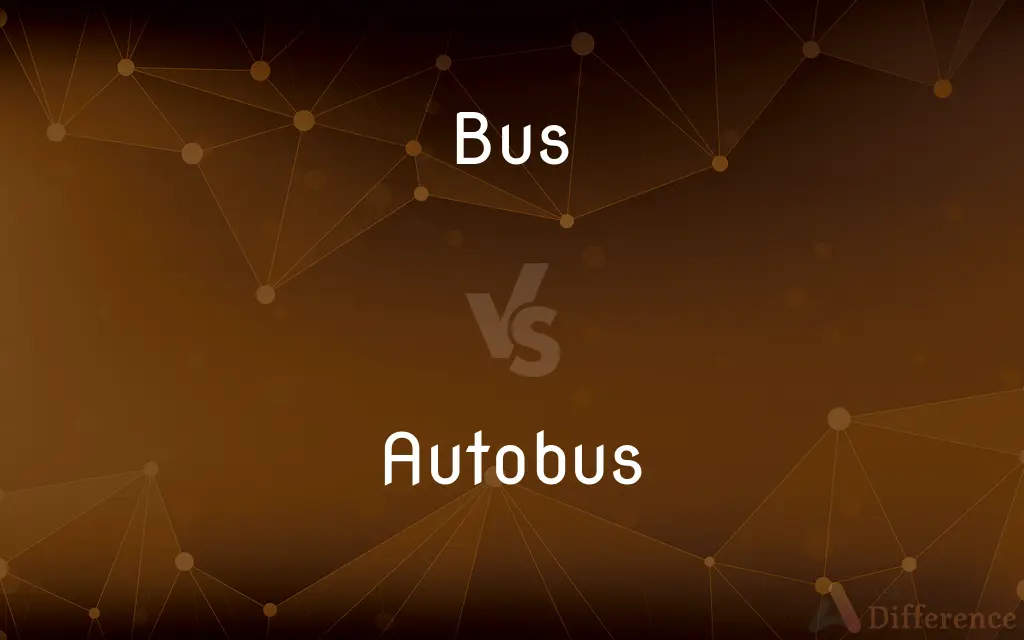Bus vs. Autobus — What's the Difference?
Edited by Tayyaba Rehman — By Urooj Arif — Updated on March 26, 2024
Bus is a common term for a large motor vehicle designed to carry passengers, while autobus is a less commonly used term that refers to the same type of vehicle, often in specific linguistic or regional contexts.

Difference Between Bus and Autobus
Table of Contents
ADVERTISEMENT
Key Differences
A bus is a widely recognized term for a large vehicle that carries passengers along designated routes or on chartered trips. It is used universally in English-speaking countries and is understood globally. Buses are integral to public transportation systems, facilitating city travel, long-distance journeys, and everything in between. Autobus, on the other hand, is a term that mirrors the word 'bus' but is less commonly used in everyday English. It originates from the combination of "auto" (meaning self) and "bus," suggesting a self-propelled vehicle for passenger transport. While "autobus" can be found in English, it is more prevalent in other languages and regions, particularly in Europe.
The primary difference between the two terms lies in their usage and prevalence. "Bus" is the go-to word in English for referring to all types of passenger vehicles, from school buses to luxury coaches. It is concise and universally understood within the context of public transport.
"Autobus" might be used for emphasis in certain contexts or to evoke a sense of nostalgia or formality. It could also appear in regions where linguistic preferences lean towards longer or more formal terms. However, in the vast majority of English-speaking contexts, "bus" is the preferred term.
Despite these differences, the terms "bus" and "autobus" refer to the same concept: a vehicle designed to transport passengers. The choice between them largely depends on regional language norms and the specific context in which they are used.
Both bus and autobus serve the same function in society: facilitating mass transit and reducing individual reliance on personal vehicles. They contribute to urban planning and mobility, offering an economical and environmentally friendlier alternative to cars.
ADVERTISEMENT
Comparison Chart
Definition
A large motor vehicle for passenger transport.
Synonym for bus, less common in English.
Usage
Universally used in English-speaking regions.
More common in non-English languages or specific regional contexts.
Prevalence
The standard term in public transport contexts.
Less frequently used in everyday English.
Context
Suitable for all references to passenger vehicles.
Used for emphasis, formality, or in certain linguistic regions.
Function
Facilitates mass transit and public transportation.
Identical to bus, no functional difference.
Compare with Definitions
Bus
Integral to urban public transportation systems.
Buses help reduce traffic congestion in the city.
Autobus
Another term for a bus, often used formally.
The tour company operates several luxury autobuses.
Bus
A large vehicle designed for public transport.
She takes the bus to work every day.
Autobus
Can refer to large, motorized passenger vehicles.
The school has added a new autobus to its fleet.
Bus
Operates on fixed routes and schedules.
The city bus route covers all major districts.
Autobus
Common in certain languages and regions.
In Italy, the word for bus is autobus.
Bus
Can be chartered for private trips.
We chartered a bus for the school field trip.
Autobus
Used interchangeably with bus in some contexts.
The autobus schedule is similar to the city bus service.
Bus
Varies in size and capacity.
The double-decker bus can accommodate more passengers.
Autobus
May denote a sense of nostalgia or formality.
The vintage autobus was restored to its original condition.
Bus
A bus (contracted from omnibus, with variants multibus, motorbus, autobus, etc.) is a road vehicle designed to carry many passengers. Buses can have a capacity as high as 300 passengers.
Autobus
A motorcoach; a bus.
Bus
A large motor vehicle carrying passengers by road, typically one serving the public on a fixed route and for a fare
A bus service
Autobus
A bus that is a motor vehicle, as opposed to earlier horse-drawn buses.
Bus
A distinct set of conductors carrying data and control signals within a computer system, to which pieces of equipment may be connected in parallel.
Autobus
A large group of cyclists who have fallen behind the main]] group of riders in a race.
Bus
Transport in a communal road vehicle
Staff were bussed in and out of the factory
Autobus
A vehicle carrying many passengers; used for public transport;
He always rode the bus to work
Bus
Remove (dirty plates and dishes) from a table in a restaurant or cafeteria.
Bus
A long motor vehicle for carrying passengers, usually along a fixed route.
Bus
(Informal) A large or ungainly automobile.
Bus
A four-wheeled cart for carrying dishes in a restaurant.
Bus
(Electricity) A bus bar.
Bus
(Computers) A parallel circuit that connects the major components of a computer, allowing the transfer of electric impulses from one connected component to any other.
Bus
To transport in a bus.
Bus
To transport (schoolchildren) by bus to schools outside their neighborhoods, especially as a means of achieving racial integration.
Bus
To carry or clear (dishes) in a restaurant.
Bus
To clear dishes from (a table).
Bus
To travel in a bus.
Bus
To work as a busboy.
Bus
(automotive) A motor vehicle for transporting large numbers of people along roads.
Bus
An electrical conductor or interface serving as a common connection for two or more circuits or components.
Bus
Part of a MIRV missile, having on-board motors used to deliver the warhead to a target.
Bus
An ambulance.
Bus
To transport via a motor bus.
Bus
To transport students to school, often to a more distant school for the purposes of achieving racial integration.
Bus
To travel by bus.
Bus
To clear meal remains from.
He bussed tables as the restaurant emptied out.
Bus
To work at clearing the remains of meals from tables or counters; to work as a busboy.
He’s been bussing for minimum wage.
Bus
An omnibus.
Bus
A vehicle carrying many passengers; used for public transport;
He always rode the bus to work
Bus
The topology of a network whose components are connected by a busbar
Bus
An electrical conductor that makes a common connection between several circuits;
The busbar in this computer can transmit data either way between any two components of the system
Bus
A car that is old and unreliable;
The fenders had fallen off that old bus
Bus
Send or move around by bus;
The children were bussed to school
Bus
Ride in a bus
Bus
Remove used dishes from the table in restaurants
Common Curiosities
What is a bus?
A bus is a large motor vehicle designed to carry multiple passengers along designated routes.
Are bus and autobus the same?
Yes, both terms refer to the same type of passenger vehicle, with the difference lying mainly in usage and linguistic preference.
Can the term autobus be found in English dictionaries?
Yes, "autobus" is recognized in English dictionaries but noted as less common or used in specific contexts.
How does public perception of bus and autobus differ?
Public perception does not differ significantly regarding their function; the distinction lies more in linguistic preference and regional usage.
Is there any functional difference between a bus and an autobus?
No, there is no functional difference; both terms describe vehicles used for passenger transport.
In which contexts might one prefer to use autobus over bus?
Autobus might be preferred for formal use, in nostalgic references, or in specific linguistic regions where it is more common.
Why is bus more commonly used than autobus?
"Bus" is shorter, more universally recognized, and easier to use in everyday English-speaking contexts.
How do buses and autobuses contribute to environmental sustainability?
By facilitating mass transit, they reduce the number of individual vehicles on the road, contributing to lower carbon emissions.
Do buses and autobuses serve the same purpose in public transportation?
Yes, both are integral to public transportation systems, providing essential services for mass transit.
Are there specific countries where autobus is used more frequently than bus?
Yes, in many non-English speaking European countries, "autobus" is the standard term for what is referred to as a "bus" in English.
What does autobus mean?
Autobus is another term for bus, used less commonly in English but prevalent in other languages and specific regions.
What historical significance does the term autobus have?
Autobus reflects the historical development of motorized passenger transport, embodying the transition from horse-drawn carriages to self-propelled vehicles.
Can both buses and autobuses be used for long-distance travel?
Yes, both terms can describe vehicles used for long-distance routes as well as short city commutes.
How does the use of bus and autobus impact urban mobility?
Regardless of the term, these vehicles play a crucial role in urban mobility, reducing congestion and environmental impact.
Is there a preference for using autobus in certain industries or sectors?
The term autobus might be more prevalent in the tourism sector or in historical and cultural contexts, where it adds a formal or nostalgic touch.
Share Your Discovery

Previous Comparison
Buying vs. Procurement
Next Comparison
Cosy vs. SnuggleAuthor Spotlight
Written by
Urooj ArifUrooj is a skilled content writer at Ask Difference, known for her exceptional ability to simplify complex topics into engaging and informative content. With a passion for research and a flair for clear, concise writing, she consistently delivers articles that resonate with our diverse audience.
Edited by
Tayyaba RehmanTayyaba Rehman is a distinguished writer, currently serving as a primary contributor to askdifference.com. As a researcher in semantics and etymology, Tayyaba's passion for the complexity of languages and their distinctions has found a perfect home on the platform. Tayyaba delves into the intricacies of language, distinguishing between commonly confused words and phrases, thereby providing clarity for readers worldwide.














































